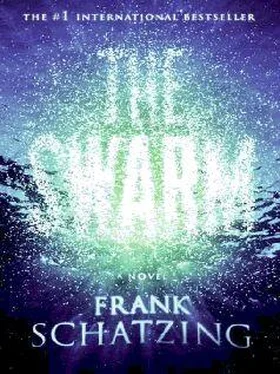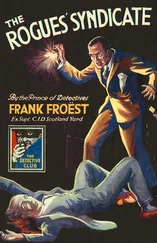'No problem. We'd normally have to train you, but there's no time for that. In any case, the suit is one third of your protection. You can rely on it 100 per cent. It's made of impermeable PVC. The other two thirds are caution and concentration. Wait, I'll help you put it on.'
The suit was pretty bulky. Johanson pulled on a kind of waistcoat, designed to distribute the intake of air evenly round his body, then struggled into the yellow overall, keeping pace with Oliviera's explanations.
'Once you're safely in the suit, we'll hook you up to the air system and fill your overall with dehumidified, tempered air. The charcoal filter supplies it under positive pressure. That's important, since it stops air entering in the event of a leak. Any surplus air exits via the exhaust valve. You can regulate the supply yourself, but that shouldn't be necessary. OK? How do you feel?'
'Like the Michelin man.'
Oliviera laughed and they walked out of the first airlock. Johanson could hear Oliviera's muffled voice in his ears and realised they were all wired up: 'The air pressure in the laboratory is maintained at fifty pascals below atmospheric pressure. Not a single spore will ever find its way out. If we lose power to the facility, there's an emergency back-up so there's unlikely to be any problem. The floor is made of sealed concrete and the windows are bulletproof. The air inside the laboratory is decontaminated using high-tech filters. There aren't any drains because we sterilise liquid waste within the building. We can communicate with the outside world via radio, fax or computer. The freezers and the air-regulation system are fitted with alarms that will go off simultaneously in the control room, the virological lab and at Reception. Every last corner of the facility is under video surveillance.'
'Too right,' Vanderbilt boomed, through the speaker system. 'So if any one of you drops dead down there, there'll be a great home movie for the kids.'
Johanson saw Oliviera roll her eyes.
They walked through the other sealed chambers and into the lab. The room covered an area of about thirty square metres and looked rather like a restaurant kitchen, with its freezers, fridges and wall-mounted cupboards. Lined up against one of the walls large metal barrels contained viral cultures and other organisms preserved in liquid nitrogen. There was plenty of space to work on the various benches. The interior of the lab had been designed so that there were no sharp edges to damage the suits. Oliviera pointed to three big red buttons that allowed them to sound the alarm, then led them over to one of the benches. She opened a tub-shaped container. Little white crabs sat in thirty centimetres of water, showing no sign of life. Oliviera picked up a metal spatula and prodded them, but none moved. 'They're dead, I reckon.'
'Unfortunate,' said Rubin. 'Didn't they promise us live specimens?'
'According to Li, they were alive at the start of the journey,' said Johanson. He leaned forwards and studied them one by one. He patted Oliviera's arm. 'Second to the left. Its leg twitched.'
Oliviera ferried the crab to the work surface, where it sat for a few seconds, then raced at speed towards the edge of the bench. Oliviera brought it back. It allowed itself to be pushed across the table without protest, then tried once more to flee. Oliviera repeated the procedure a few times, then replaced the crab in the tub. 'Any immediate thoughts?' she asked.
'I'd have to look inside it,' said Roche.
Rubin shrugged. 'It's behaviour seems normal enough. I'm not familiar with the species, though. Can you identify it, Dr Johanson?'
'No.' Johanson thought for a moment. 'But its behaviour isn't normal. Under normal circumstances it would see the spatula as its enemy. You'd expect it to splay its claws and wave them threateningly. In my opinion, its motor activity is normal, but there's a problem with its senses. It looks to me-'
'Like a clockwork toy,' said Oliviera.
'Right. It scuttles like a crab, but it doesn't behave like a crab.'
'Do you know what species it could be?'
I'm not really a taxonomist. I can tell you what I think, but you shouldn't take my word for it.'
'Go on.'
'There are two interesting features.' Johanson picked up the spatula and touched a few motionless shells. 'First, the crabs are white. Colourless. Nature never uses colours for decoration, always for a purpose. Most colourless organisms live in places they can't be seen, which is why they don't need colour. The second feature is the lack of eyes.'
'You mean they come from caves or from the depths?' said Roche.
'Yes. Some creatures that live in darkness have traces of eyes – atrophied, of course, but you can see where they used to be – but these crabs, well, I'd say they never had eyes in the first place. If that's the case, then their habitat must be pitch-black. In fact, they must have evolved in the dark. As far as I'm aware, that applies to only one species of crab that looks anything like these.'
'Vent crabs,' nodded Rubin.
'And where do they come from?' asked Roche.
'Deep-sea hydrothermal vents,' said Rubin. 'Volcanic oases of life.'
Roche frowned. 'Then they shouldn't be able to survive on land.'
'The real question is, what has survived?' said Johanson.
Oliviera fished a dead crustacean out of the tub, turned it on its back and laid it on the bench. She gathered up a series of implements resembling crab picks, and cut into the side of the carapace with a tiny, battery-driven circular saw. A transparent substance spurted into the air. Oliviera continued unperturbed until the shell was divided in two. She picked up the underside, with the legs attached, and moved it to one side.
They stared at the dissected creature.
'That's not a crab,' said Johanson.
'No,' said Roche. He pointed to the semi-fluid, clumpy mass of jelly that filled most of the shell. 'It's the same gunk we found in the lobsters.'
Oliviera spooned the jelly into a jar. 'Look at this,' she said. 'Behind the head it still looks like a proper crab. See these fibres running down the middle? They're its nervous system. The crab's got all its senses, just nothing to help it use them.'
'Actually,' said Rubin, 'it's got the jelly.'
'It's not a crab in the normal sense.' Roche peered at the transparent gunk in the jar. 'It functions, but it's not alive.'
'Which explains why it doesn't behave like a crab – assuming we don't identify the stuff inside it as a new type of crab meat.'
'No way,' said Roche. 'It doesn't belong to the crab. It's a foreign organism.'
'In that case, the foreign organism is responsible for making these crabs come on land,' said Johanson. 'What we need to find out is whether the crabs were dead and it slipped inside to try to bring them back to life or…'
'Whether they were bred like that,' Oliviera finished for him.
There was an uncomfortable pause. Finally Roche broke the silence. 'Well, wherever this stuff is coming from, you can guarantee we'd all be dead without these suits. I'm willing to bet that these crabs are bursting with Pfiesteria or maybe something worse. The air in this laboratory is almost certainly contaminated.'
Johanson remembered what Vanderbilt had said. Biological weaponry. He was right, of course. Spot on. Just not in the way he'd assumed.
WEAVER
Weaver felt a rush of euphoria. She only had to enter her password and the laptop gave her access to more information than she'd ever imagined. Under normal circumstances it would have taken her months to gather the kind of data she had here – and even then the military satellites would always have been off-limits. But this was amazing! She could sit on the balcony of her suite, log into NASA's server and immerse herself in the American military's satellite maps.
Читать дальше












